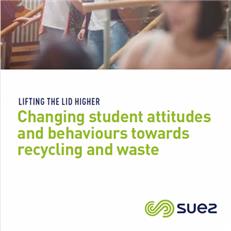Report | Lifting the lid higher - Changing student attitudes and...

Based on 2019 research carried out with the National Union of Students’ educational charity - Students Organising for Sustainability UK, the report updates SUEZ’s 2013 research into students’ attitudes and behaviours towards recycling and waste, and points to opportunities to raise recycling performance on campus and in student accommodation.
Today’s students are more active recyclers than their predecessors of 2013. Both the number of students recycling regularly, and the commitment shown by students towards recycling have increased:
The research found the type of student accommodation to be a factor in recycling behaviour, with students living in university-owned halls of residence and privately-rented houses more likely to make additional efforts to recycle. Encouragingly, although students living in privately-owned halls of residence showed less commitment to recycling, they make up almost a third of respondents considering making a positive change to their behaviour, giving hope for the future.
For institutions looking to improve their performance, the convenience and scope of recycling facilities and services should be high up the list for review, with the research showing a correlation between the convenience of facilities available and commitment to recycling. According to 40-50% of respondents, providing more bins, in more convenient locations, and collecting a wider range of materials are the best ways to boost recycling.
With 50% of respondents unable to recall receiving information about recycling on campus, rising to 60% at their term-time accommodation, clear information about recycling services and the benefits of recycling is needed to support and motivate students to recycle.
John Scanlon, Chief Executive Officer for SUEZ recycling and recovery UK said: "Although the increase in recycling amongst students since 2013 isn’t as emphatic as we might have hoped given the unprecedented levels of concern around climate change and the environment, the steady progress since 2013 coupled with opportunities to raise future performance is cause for optimism. As we have seen in recent weeks, the COVID-19 pandemic, unforeseen at the time of our research, is bringing new challenges for the education sector which may well result in sustained changes to how it delivers services to students, making it even more important that we encourage greater sustainability among higher education institutions in a post COVID world."
